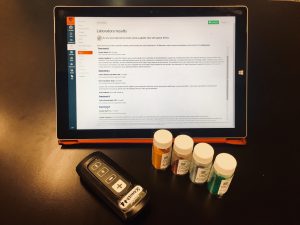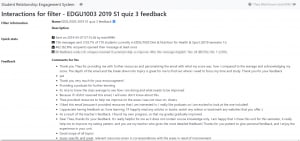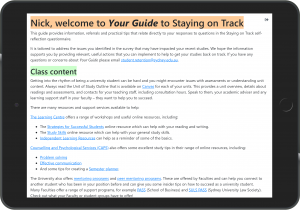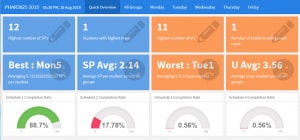Join over 100 educators from 7 universities on Tuesday 19 November 2019 to share good practice around personalising student learning using data. Specifically, we’ll be looking at the many ways in which the Student Relationship Engagement System (SRES) has been used in real classes by real educators to foster teacher-student relationships, personalise support, empower teaching teams with relevant information, make teaching more efficient, enhance student learning through feedback, and everything in between.
SRESCon2019 is being organised by Educational Innovation from the DVC (Education) Portfolio in conjunction with the Centre for Research on Learning and Innovation at the University of Sydney.
SRESCon?
Inspired by CanvasCon this year, we are bringing together over 20 speakers and 100 delegates to discuss how data is being used in many contexts to improve student learning. Some may have heard of SRES as purely a mail merge system, while others as an attendance system, and still others as a Canvas analytics supplement. It is these, but much more. The talks and workshops at SRESCon2019 will help to uncover a diverse range of applications of student data and practical learning analytics by educators.
Here’s a taste of what’s coming up at SRESCon2019:

Shane Wilkinson and Markus Muellner from the School of Chemistry use SRES to automate and process vast quantities of data to provide rapid access to information for both teachers and students. SRES helps to collect, collate and output a series of assessment data (attendance, pre-work, sample marks, oral marks, etc) from their chemistry laboratories. Teachers use this data in assessing students’ completion of the laboratory program. These results are also instantly available to students through Canvas portals in the form of marks and constructive feedback.
Tristan Cui and Charanjit Kaur from the Monash Business School will present a case study of the extended use of SRES through the development of a ‘collaborative intervention model’ in a cross-departmental collaborative effort. This model promotes early intervention across 2 core postgraduate units within a single programme. They will discuss the framework of the model, the findings and its impact on academic achievement as well mental and emotional well-being of students. They have also written about SRES in the past.

Thea Werkhoven from the Sydney School of Education and Social Work uses SRES to smarten up the use of her time as a lecturer and coordinator by taking attendance and providing students with assessment feedback. She also uses it, quite successfully, to connect with students individually when it is not always possible face to face in a large scale elective. SRES helps Thea to solve issues around personalised feedback, student belonging, tailored communication, and large unit administration.
Maria Ishkova, Mesepa Paul, Anya Johnson, and Helena Nguyen from the Sydney Business School use SRES to help personalise teaching and learning at any scale, and to grow professionally as educators. Amongst other things, they use SRES to provide personalised feedback to 800+ students each semester, and to streamline their unit administration.

Lakia Turner from Student Support Services uses SRES to provide personalised, relevant advice, tips and referrals to support for students participating in the Staying on Track program. SRES offers an easy, online questionnaire option that auto-generates personalised and relevant support for a large number of students. Using SRES solves the issue of providing personalised support to a large number (over 3000) students. Feedback from students who have used the SRES Staying on Track questionnaire is positive because it provides them relevant, timely support.
Caleb Owens from the School of Psychology will speak about the curiously titled “Online engagement with SRES in the age of fragility”. He has used SRES to help personalise learning support for his large first year psychology cohorts for over five years, impacting tens of thousands of students.

Ardi Mirzaei and Andrew Bartlett from the Sydney School of Pharmacy use SRES to reduce paper entering and increase seamless feedback to students. Connection are built between Canvas and SRES to help implement this. Furthermore, they have built custom analytics using SRES data that are presented efficiently to tutors and coordinators to allow for interventions to student needs.
Ju Li Ng and Kevin Lowe from the Sydney Business School will share how they initially started using SRES to overcome difficulties with group marking and personalised feedback, to now adapting SRES functionalities to personalise and enhance students’ learning experience by using SRES as one-stop platform where students can self-assessment, peer-evaluate and self-reflect on their teamwork abilities. This has also simplified the use of technology where all data is being stored in SRES instead of having to employ multiple technological platform or apps.
Whether you’ve never heard of SRES or are an experienced user, you’ll get something out of hearing how educators are engaging students, fostering positive relationships, and providing timely personalised feedback and support using relevant data. From in-class grading and feedback to personalised web portals; from peer feedback and self reflection to getting to know your cohort; from fostering positive attendance patterns to identifying and supporting at risk students; from leveraging Canvas data to powerful personalised emails – SRES has something that every educator can use.
Through SRESCon, we hope to help even more educators use the right data the right way to improve students’ learning experiences and outcomes, all while saving time and improving quality.
Find out more and register
Tell me more!
- Not from the University of Sydney, The University of Melbourne, and Monash University have their own installations of SRES running, and we are in discussions with many more. SRES is freely available to other institutions – get in touch to find out how.
- Check out what others are doing with SRES, including getting to know students better, personalising feedback at scale, and encouraging students in large cohorts.
- Get a deeper idea of what SRES can do by digging into the practical tutorial guides.
- University of Sydney staff can join the SRES Yammer group to stay up to date.




